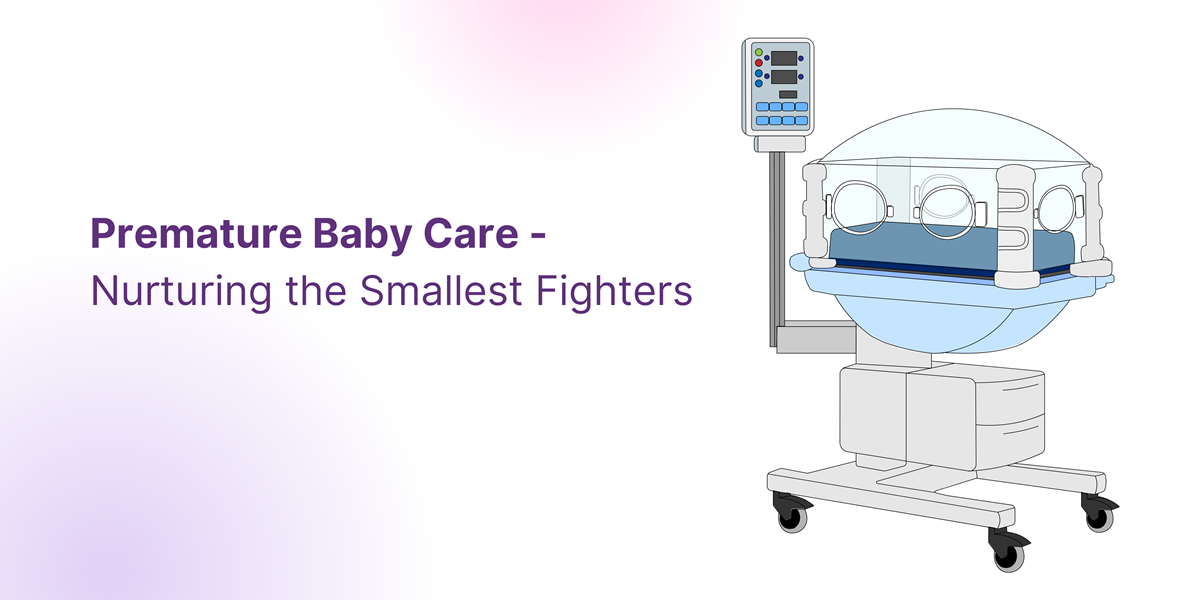Premature Baby Care - What Parents Need to Know
Apr 2 • 3 min read

Table of Content
Premature babies often go through neonatal monitoring in NICU/PICU. They require specialised treatment and attention due to their unique needs. As a parent, it's essential to understand the importance of how to care for a premature baby and learn to effectively nurture and support your little one during this critical stage of their development.
What to Consider When Taking Care of Your Premature Baby?
Pregnancy is a tough phase but the real challenge begins when your baby has arrived into the world and if it is a premature baby, the journey itself becomes more challenging. So, make sure you take regular consultations from doctors and monitor your baby using neonatal in-home health monitoring devices as suggested by your doctor.
Here are some key aspects to consider when providing care for your premature baby:
Kangaroo Care: Bonding and Comfort
Skin-to-skin contact or Kangaroo Care is considered as a beneficial practice for premature babies. When you hold your baby against your bare chest, you can provide both physical and emotional comfort, which can aid in their growth and development. This intimate contact promotes bonding, regulates body temperature, and supports breastfeeding.
Monitoring Temperature and Environment
If your baby is a premature baby, keep a check on the temperature as they are more sensitive to temperature changes. So it's crucial to keep their environment warm and comfortable. You can use a temperature-controlled incubator or warmer and dress your baby in layers to maintain a stable body temperature.
Make sure you regularly monitor their body temperature and adjust their clothing accordingly. It is important to avoid exposing them to extreme temperatures during the initial growth.
Feeding Strategies: Breast Milk and Nutritional Support
Breast milk is the best source of nutrition for premature babies. It provides essential nutrients and antibodies that help develop their immune system and prevent infections. However, premature babies may face challenges during breastfeeding due to weak sucking reflexes or underdeveloped digestive systems.
If you are facing the challenge to breastfeed your baby, consult with a lactation specialist or neonatal nurse to explore options such as breast milk pumping, fortified breast milk, or specialised formulas to ensure your baby receives adequate nutrients.
Managing Respiratory Health
Premature babies often have underdeveloped lungs, which can lead to respiratory difficulties. Make sure there is a clean and dust-free environment to reduce the risk of respiratory infections.
In most cases, you may also need to monitor your baby's oxygen levels using neonatal in-home health monitoring devices and provide respiratory support, such as through the use of a nasal cannula or ventilator, if necessary. Regular check-ups with a neonatal doctor will help track your baby's lung development and address any concerns.
Supporting Developmental Milestones
Due to their early arrival, premature babies may experience delays in reaching developmental milestones. By encouraging them to engage in activities that promote their physical and cognitive development, such as tummy time, gentle massages, and age-appropriate toys.
You can consult with your paediatrician or a developmental specialist to create a personalised plan to support your baby's progress.
Conclusion
Remember, taking care of a premature baby is a journey that requires patience, support, and guidance. Seek assistance from healthcare professionals, join support groups, and connect with other parents who have gone through similar experiences.
With the right care, love, and support, your little fighter will thrive and overcome the challenges of their early start in life.
FAQs
a) What are the common health issues premature babies face?
Premature babies are at higher risk for respiratory problems, feeding difficulties, infections, jaundice, and neurological issues such as cerebral palsy or developmental delays.
b) How are premature babies cared for in the neonatal intensive care unit (NICU)?
In the NICU, premature babies receive specialised medical attention, including monitoring of vital signs, respiratory support, feeding through tubes, and treatment for any health issues that may arise.
c) How can parents bond with their premature baby in the NICU?
Parents can bond with their premature baby by participating in care routines such as feeding, diaper changes, and kangaroo care (skin-to-skin contact).
d) What is kangaroo care, and how does it benefit premature babies?
Kangaroo care involves holding a diaper-clad premature baby against the parent's bare chest. It helps regulate the baby's body temperature, heart rate, breathing, and promotes bonding between parent and baby.
f) What can parents do to support their premature baby's development after leaving the NICU?
Parents can continue providing a nurturing environment at home, ensuring proper nutrition, following up with healthcare providers for regular check-ups, and engaging in activities to promote their baby's development and regular monitoring with neonatal vitals monitor.